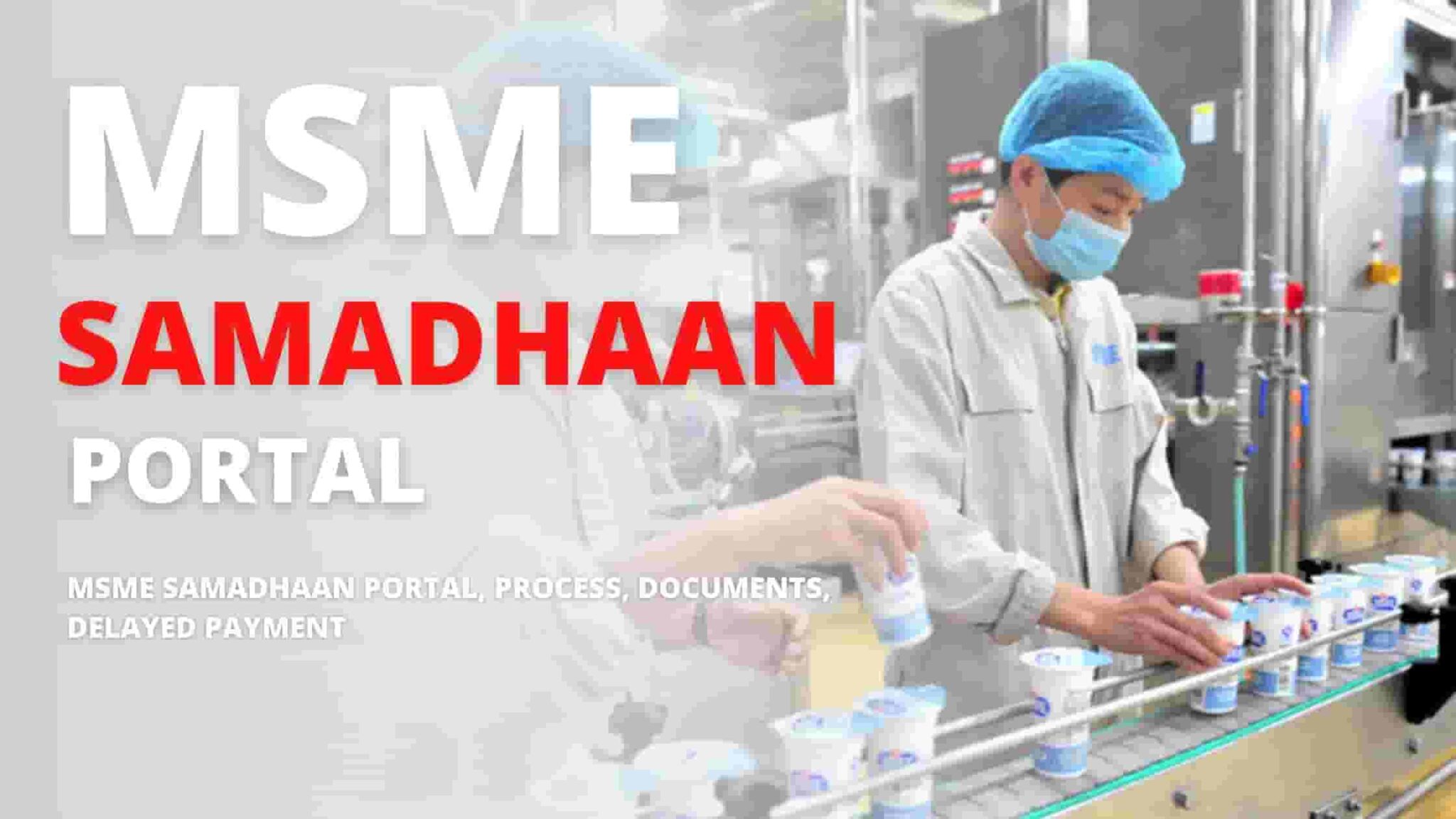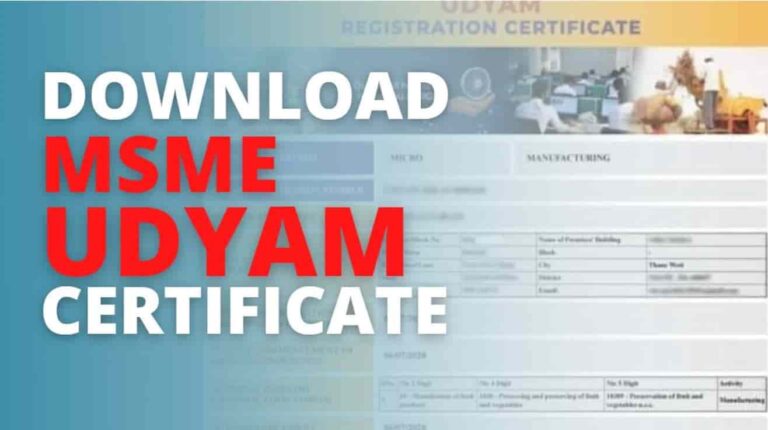We hope everything is going well for everyone; this article will be useful for small companies looking to collect their outstanding debts from corporations and other organisations through the MSME Samadhaan portal.
The Government of India has adopted a variety of initiatives to promote and grow MSME, or Micro, Small, and Medium Enterprises, since it is believed that this sector is essential to a nation’s overall development.
Furthermore, these small companies play an important part in a country’s economy since they not only produce output but also contribute to the creation of job possibilities for the younger population.
Going ahead, as the title of this article suggests, I will limit the flow to the recovery of late payments, presuming that you are all well acquainted with the laws relating to the categorization and other conditions for the recognition of MSME.
What is the MSME Samadhaan Portal?
MSME Samadhaan is an online platform established by the Ministry of Micro, Small and Medium Enterprises (MSMEOffice) of DC(MSME), through which Micro and Small Enterprises (MSEs) can apply for delayed payments.
MSME SAMADHAAN is an online Delayed Payment Monitoring System operated by the Micro and Small Enterprise Facilitation Council (MSEFC) for resolving disputes over receiving references/filing on Delayed Payments by aggrieved MSMEs (Micro, Small, and Medium Enterprises) who can submit complaints and track their status online.
MSMED Act 2006
The Micro, Small, and Medium Enterprise Development (MSMED) Act of 2006 includes rules for dealing with situations of late payment to Micro and Small Enterprises (MSEs).
The Ministry of Micro, Small, and Medium Enterprises (MSME) has established the MSME Delayed Payment Portal – MSME Samadhaan to allow micro and small entrepreneurs across the country to immediately file their complaints pertaining to delayed payments by Central Ministries/Departments/CPSEs/State Governments.
According to the provisions, the buyer is obligated to pay compound interest with monthly rests to the supplier on the amount at three times the bank rate notified by the Reserve Bank if he fails to pay the supplier for the supplies of goods or services within 45 days of the day of acceptance of the goods/services or the deemed day of acceptance.
State governments will form the Micro and Small Enterprise Facilitation Council (MSEFC) to resolve issues regarding acquiring references and applying for Delayed payments. (See Sections 20 and 21.)
Any micro or small business with a valid Udyog Aadhar (UAM) can apply. After reviewing the case submitted by the MSE unit, the State MSEFC will issue instructions to the buyer unit for payment of the due amount plus interest in accordance with the requirements of the MSMED Act 2006. Every referral made to MSEFC must be resolved within ninety days of the day the reference was made, according to the provision.
The requirements of the Act are carried out by the MSEFC, which is led by the Director of Industries of the State/UT that has administrative responsibility over the MSE units.
MSME Samadhaan Portal
The Ministry of MSME has taken the step to allow the supplier MSE unit to file an online application against the buyer of goods/services before the appropriate MSEFC of his/her State/UT. MSEFC Council will consider these for future actions. These will also be visible to the concerned Central Ministries, Departments, CPSEs, State Governments, and so on for proactive measures.
File Online Application by MSME: Entrepreneurs and MSMEs can use the platform to file online applications for delayed payments. To file an application, a user must have an Udyog Aadhaar Number that has been confirmed with Aadhaar.
Monitor Case Status: Using the portal, entrepreneurs and micro, small, and medium-sized enterprises (MSMEs) can check the status of their online applications for delayed payments.
Dashboard of Pending Payments: The Portal will provide information on MSEs’ pending payments with specific CPSEs / Central Ministries, State Governments, and so on. The CEOs of PSEs and the Secretaries of the Ministries involved would also be able to monitor incidents of late payment within their authority and provide appropriate orders to remedy the difficulties.
Benefits of MSME Samadhan Portal
The site provides a variety of tools that Entrepreneurs / MSEs can use. Some of the features are as follows:
- The site assists entrepreneurs in efficiently tracking delayed payments.
- The portal’s content will be freely accessible to the public.
- MSMEs will also be able to visit the platform and track their cases.
- The CEOs of PSEs and the Secretaries of the Ministries involved will also closely monitor the delayed payment of MSEs and problems.
- Enterprises can file lawsuits if they do not get funds from PSUs or government bodies within 45 days.
Required Document To File Application For Delayed Payment
The paperwork checklist for filing a delayed payment application is provided below.
- You must provide scanned PDF documents of Respondent’s work orders and invoices created in response to those orders.
- The document’s size cannot exceed 1 MB.
- A total of three work orders and three invoices can be uploaded.
File Application via MSME Samadhaan
As previously indicated, any disagreement over the payment of punitive interest between the supplier and the buying unit must be referred to the Micro and Small Enterprises Facilitation Council (MSEFC).
The Indian government has developed an MSME Samadhaan site to track late payments. This MSME Samadhaan is utilised while submitting an application to the Micro and Small Enterprises Facilitation Council (MSEFC).
Micro and small businesses that have an Udyog Aadhaar Memorandum can apply through the MSME Samadhaan site.
The following information must be filed in the application by micro or small businesses.
- Specifications of the supplier unit
- The supplier unit’s current status
- Specifics about the goods or services provided
- Payment Conditions
- Payment received in full
- Date of receipt of real payment
- Amount Interest is computed in accordance with Section 16 of the MSED Act.
Along with the application, the supply unit must include the following documents:
- Stamped Court Fee
- Affidavit
Quick look to the relevant Provisions
The provisions in Chapter V of the Micro, Small and Medium Enterprises Development Act, 2006 (hereinafter “MSMED”) pertaining to the recovery of the due from the customer in the case of any service(s) availed or good brought by him were as follows.
Section 15: It requires the customer to make payment if he uses any service(s) or brings any goods on or before the agreed-upon date, otherwise before the appointed date.
It should be emphasised that the term, whether stipulated in writing or not, cannot exceed 45 days from the day of acceptance or presumed acceptance. This means that the buyer must pay within 45 days in all circumstances. It is similarly crucial to grasp the meaning of the phrases appointed date, day of acceptance, or presumed acceptance as they are used jointly in the aforementioned provision.
Appointed Date:
The appointed date is the day that occurs immediately after the expiration of the 15-day period beginning on the day of acceptance or presumed acceptance of any products or services by a buyer from a provider.
Day of Acceptance:
(a) the date of actual delivery of goods or performance of services; or
(b) the day on which the supplier removes any objection made in writing by the customer regarding acceptance of goods or services within 15 days after the day of delivery of goods or rendering of services;
Day of Deemed Acceptance:
When no objection is raised in writing by the buyer about acceptance of goods or services within fifteen days of the day of delivery of goods or rendering of services, the day of actual delivery of goods or rendering of services is referred to as the Day of Deemed Acceptance.
Section 16: In the event that the buyer fails to comply with the aforementioned condition, he will be responsible to pay compound interest with monthly rests. The interest rate will be three times the bank rate announced by the RBI.
Section 17: The buyer must pay the purchase price plus interest.
Section 18: MSME may refer to the Micro and Small Enterprises Facilitation Council (“MSEFC”), and MSEFC may take action on its own if required.
Though the mechanisms for recovery have always been present since the Act’s inception, it is extremely difficult for small businesses registered under the Act to collect outstanding debts from Big Entities. Furthermore, the situation persists; if you are also encountering the same issue, i.e., whom to visit or before whom to make an application and/or complaint, or if you have any concerns, here is how you may get help.
How to recover Delayed Payment by MSME
Please follow the instructions below to file the application for delayed payment.
The Government of India has launched the www.samadhaan.msme.gov.in site, a one-of-a-kind and central location where all MSMEs may register their compliance.
Step 1: Navigate to the above-mentioned website and seek for the option case filing for entrepreneurs/MSE units in the menu bar. After selecting the aforementioned option, enter your UAN and the cellphone number you gave during registration, as well as the verification captcha. Following that, a one-time password will be given to your registered email address; please enter it and click on proceed.
Step 2: You will now see the option Application entry, which will assist you in filing an application and/or compliance with the relevant authorities. Before filling it out, please have the details of work orders and/or invoices available, as well as any other document that can substantiate your claim.
You may supply the data through the portal if it is fewer than 5, but if it is more than 5, you can consolidate all invoices into a single PDF and upload it to the web-portal and submit it, after which another page will appear for evaluation and final submission.
Step 3: Once completed, MSEFC will send this application to the concerned respondent, and the status of your complaint can be seen in the Entrepreneur Application list. The application will proceed faster than that of the court, and the concerned officer may ask you to come and advise him if he requires any additional documents or information.
We hope this article clarifies how to continue with filing a complaint for money recovery.
If you want any clarification, please contact us by filling the contact form.
Disclaimer: The preceding article is just for educational purposes and should not be construed as an opinion. The author shall not be held liable for any actions done as a result of the above-mentioned write-up.
Also Read:
Benefits of Udyam Registration
New MSME Classification – Micro Small Medium Enterprises
Online Udyam Registration Portal
Benefits of new Income Tax e-filing Portal in Hindi – नई आयकर इ-फ़ाईलिंग पोर्टल के फायदे ।
Difference between old and new Income Tax e-filing Portal in Hindi
New Income Tax e-filing Portal नई आयकर इ-फ़ाईलिंग पोर्टल हिन्दी में ।
Udyam Registration Benefits in Hindi -उद्यम रेजिस्ट्रैशन सर्टिफिकेट के फायदे
Udyam registration certificate kya hai – उद्यम रजिस्ट्रेशन सर्टिफिकेट क्या है
Udyam Registration NIC Code List – MSME NIC Code List
Is Udyam Registration Mandatory?
Get your Udyam Registration Now




